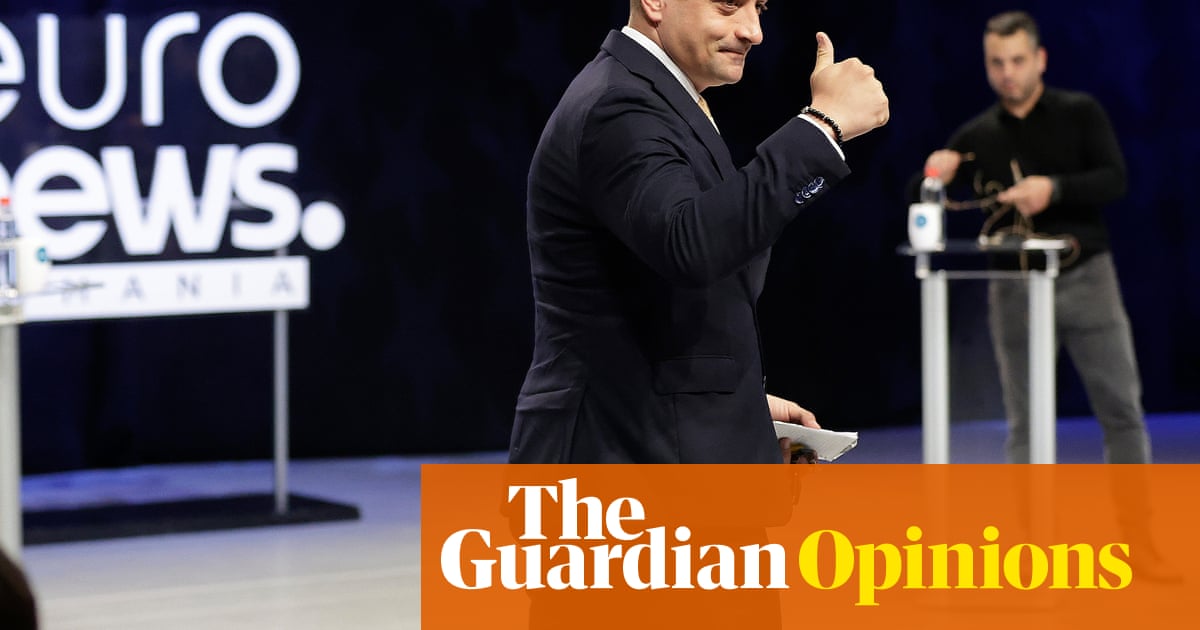At first glance, Romania’s presidential race, which comes to a head in a second round of voting this Sunday, might look like a de facto referendum on Europe. The far-right George Simion – a former football hooligan who isbanned from enteringUkraine for what Kyiv calls “systematic anti-Ukrainian activities” – surged to first place in thefirst roundlast week with 41% of the vote. Trailing him is Nicușor Dan, Bucharest’s reformist mayor, with just 21%.
The race pits Dan, a technocratic pro-European candidate, against a bombastic, Maga-admiring nationalist who rails against “Brussels” and promises to put the “national interest” above international obligations.
If Simion wins,Romaniarisks becoming the next illiberal outpost inside the EU, joining Hungary and Slovakia. He could use his presidential powers to stall aid to Ukraine and undermine negotiations towards a collective climate and migration policy, while sowing further distrust in EU institutions.
But the truth is that “pro-Europe” and “anti-Europe” are just labels. They disguise the fact that what Romanians are really rejecting is a domestic political class that has wrapped itself in the EU flag while overseeing years of economic stagnation, corruption and broken promises. After all, nearly 90% of Romanianssupport EU and Nato alignment, according to a survey from this year.
Both presidential candidates are, in their own way, anti-establishment. While Dan built his career fighting shady real-estate barons and politicians in the courts, Simion built his through televised outrage and fiery speeches that spoke to people’s frustrations with political elites.
Simion is backed by Călin Georgescu, the political maverick whose surprise win in the first round of presidential elections in Decemberwas annulledby Romania’s constitutional ourt, following allegations of Russian interference. Simion has adopted a similar tone, but has stopped short of openly calling for Romania to leave the EU or Nato. Distinguishing himself from Georgescu, he has called Putin’s Russia a “threat” to Europe – though he has alsocriticised military aidto Ukraine, echoing Donald Trump’s position on the war.
The Romanian diaspora accounted for about 10% of the total votes in the first round. And more than half of them backed Simion. These are Romanians who live and work in countries such as Spain, Germany, the UK and France, directly benefiting from the freedoms and economic stability provided by the EU. It is unlikely that these voters were rejecting “the west” or the EU as such, but rather a domestic political class that they blame for squandering the opportunities offered by EU membership, and the fact that they had to leave their home country in the first place.
Nevertheless, the EU’s reputation is taking a battering with Simion’s ascent. This is because his targets are successive pro-European Romanian governments, dominated by the establishment parties, which promised prosperity but presided over theembezzlementof infrastructure funds, failed to modernise hospitals and delayed highway projects that Romanians had long been promised – all while EU money poured in. Romania is currently experiencing the highest level of inflation in the EU, combined with low wages and high taxes.
Add to that the pandemic restrictions, widely seen as heavy-handed attempts to control personal freedoms, and the government’s alignment with EU policy on Ukraine, and apparent frustration at the bloc has deepened.
Elena Calistru, a Romanian civic activist and governance expert, tells me that Simion’s is a more sophisticated approach than Georgescu’s, who was outwardly proposing exiting the EU and Nato.
“Simion is seeding deep distrust in democratic institutions themselves and promoting narratives that portray Romania as a ‘second-class country’ in Europe, treated like a colony by the EU and potentially dragged into foreign conflicts,” she says.
There’s a grain of truth in his rhetoric. Romania was kept out of the Schengen area until thebeginning of this year, and Romanian migrant workers have long facedhumiliation abroad, whether as exploited construction labourers in the Netherlands or as care workers in Italy, often working in conditions that border on modern slavery. These frustrations have fed a broader sense of grievance over what many see as double standards applied to newer EU member states.
Simion’s rise, therefore, is less about policy than about national identity. His campaign slogan is “Respect”, something many Romanians, including the migrant workers in the diaspora, have been craving. “The Romania you dream of, the Romania you want to return to, we will build it together,” he said in a speech after his first-round victory.
This election will mark the end of an era. Romania’s transitional period from dictatorship to democracy is over. For the first time ever, in both the cancelled December election and now the re-run, none of the establishment parties reached the second round of the presidential elections.
Romanians won’t head to the polls on 18 May to decide whether they want to be in the EU, because they overwhelmingly do. What they’re really voting on is how to confront a broken system: through reform and international collaboration – or isolation and nationalism.
Andrei Popoviciu is a Romanian investigative journalist
